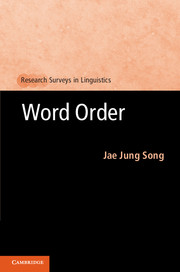Book contents
7 - Envoi
whither word-order research?
Published online by Cambridge University Press: 05 June 2012
Summary
This book opened with a mundane observation about word-order differences between English and Korean, and an often-taught school grammar rule built on that observation. While it mainly concerns the practical problem of translating one language into another, the rule does reflect well the layperson’s intuitive understanding of, not to mention their interest in, the role of word order in language. In linguistics, not unexpectedly, word order (or linear order/linearization) has long been a research topic of significant theoretical interest, as amply attested in the preceding chapters. For instance, head directionality (i.e. head-initial vs head-final), nicely encapsulated by the school grammar rule of translation, is one of the theoretical issues investigated prominently in linguistics. The book has provided a survey of word-order research by critically reviewing four important theoretical approaches (i.e. LT, GG, OT and performance-based ones, e.g. EIC Theory, DLT/SPLT), with emphasis on a number of issues emerging from each of these approaches. While they address word order in their own different ways – that is why they are thought to be different approaches in the first place – the approaches in question have evolved internally, while varying from one another, in terms of (1) deduction vs induction; (2) single vs multiple principles (or explanations); and (3) competence vs performance.
First, LT and GG contrast sharply with each other in that the former deals with cross-linguistic diversity at face value, arriving inductively at generalizations or explanations of the observed diversity, while the latter proceeds deductively with general assumptions about the nature of language, one of the consequences being the deriving of surface word orders from an abstract, universal word order (e.g. Spec-H-Compl). Moreover, GG has been highly active in its attempt to deduce word order from something (more) fundamental to language (e.g. constituent structure, Merge operation). OT, in contrast, strives to strike a balance (or to bridge the gap) between these two opposing orientations by taking account of cross-linguistic variation, as documented by LT, in conjunction with GG’s theoretical assumptions, constraints and technological or descriptive means.
- Type
- Chapter
- Information
- Word Order , pp. 304 - 310Publisher: Cambridge University PressPrint publication year: 2012



